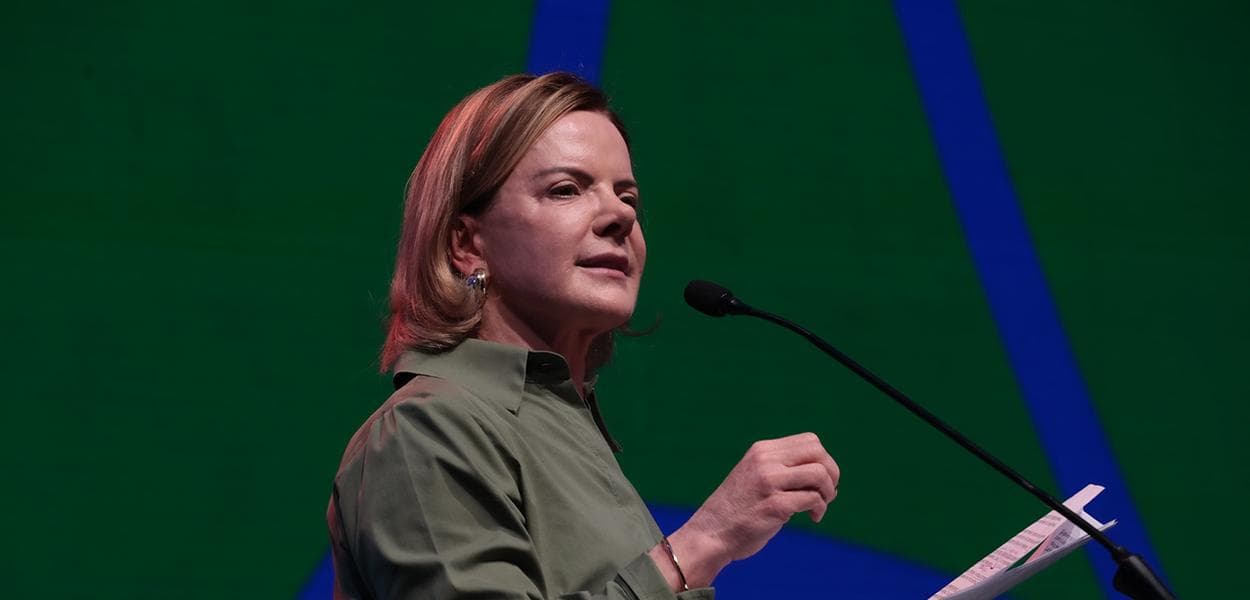247 - The Minister-Chief of the Secretariat of Institutional Relations (SRI), Gleisi Hoffmann, criticized this Friday (31) the meeting between governors from the far-right field, to discuss public security in Brazil, after the deadliest police operation in the history of the state of Rio de Janeiro ended with 121 dead in the Penha and Alemão complexes this week.
In a post on social media, the head of the SRI stated that,"voiced by Ronaldo Caiado," the right-wing governors "want to put Brazil on the radar of Donald Trump's military interventionism in Latin America," instead of "joining forces in the fight against organized crime, as proposed by the Security Amendment sent by President Lula to Congress."
"They can't hide their desire to hand the country over to foreigners, just like Eduardo Bolsonaro and his family of traitors to the nation did with the tariffs and Magnitsky. Public security is a very important issue that cannot be treated lightly or with electoral objectives. Fighting crime requires intelligence, planning, and a combined effort."
In addition to the deadliest operation in Rio's history, another controversial measure was the sending of a report to the government of US President Donald Trump detailing the activities of the Comando Vermelho (CV) criminal faction in the state by the Governor of Rio de Janeiro, Cláudio Castro (PL). Meanwhile, Senator Flávio Bolsonaro (PL-RJ) requested that US forces be deployed to Brazil.
This Thursday (30), seven governors announced the creation of the so-called"Peace Consortium", an integration project to exchange intelligence information, provide financial support and police contingent in the fight against organized crime.
The meeting took place at Guanabara Palace, the seat of the Rio de Janeiro state government. In addition to the governor of Rio de Janeiro, Cláudio Castro, and Ronaldo Caiado (Goiás), the meeting was attended by Romeu Zema (Novo), from Minas Gerais; Jorginho Mello (PL), from Santa Catarina; the vice-governor of the Federal District, Celina Leão (Progressistas); and Eduardo Riedel (Progressistas), from Mato Grosso do Sul. The governor of São Paulo, Tarcísio de Freitas (Republicanos), participated remotely via video call.
Instead of joining forces in the fight against organized crime, as proposed by the Security Amendment sent by President @LulaOficial to Congress, the right-wing governors, voiced by Ronaldo Caiado, are investing in political division and want to put Brazil on the radar of… — Gleisi Hoffmann (@gleisi) October 31, 2025
Action by the federal government
The Minister of Justice and Public Security, Ricardo Lewandowski, announced this Wednesday (29) the creation of an emergency office focused on combating organized crime in Rio de Janeiro. The announcement took place at the Guanabara Palace, after a meeting with Governor Cláudio Castro and other state authorities.
According to Lewandowski, the new body will have the function of accelerating integration between the federal and state governments, reducing bureaucratic obstacles and unifying the actions of the security forces. The minister emphasized that the goal is to quickly restore stability in the state."This will be the embryo of what we intend to institute in all states with the Public Security Amendment, in order to confront the scourge represented by organized crime," he stated.
The emergency structure will also include the participation of the Financial Intelligence and Asset Recovery Committee (CIFRA), responsible for financially weakening criminal organizations through financial intelligence, asset recovery, and technical support in money laundering investigations. The Integrated Task Force to Combat Organized Crime (FICCO), created by the Ministry of Justice and Public Security (MJSP) in conjunction with federal and state agencies, will also participate.
Lewandowski reported that the federal government has made available spaces in the maximum-security prison system for the transfer of gang leaders. He also announced the reinforcement of the National Public Security Force and an increase in the number of forensic experts. The minister added that the Federal Police will intensify intelligence operations to weaken the finances of criminal organizations.
In the National Congress, the president of the Senate, Davi Alcolumbre (União-AP), determined this Tuesday (29) the installation of the Parliamentary Commission of Inquiry (CPI) on Organized Crime, after the massacre in Rio.
The United Nations (UN) and other entities criticized the way the police operation against the Comando Vermelho (CV) criminal faction, which originated in the state in the 1970s, was conducted. Currently, the CV has strong economic power and branches in more than 20 Brazilian states.
The Security Amendment
Proposed Constitutional Amendment (PEC) 18/2025 foresees the inclusion of the Unified Public Security System (SUSP) in the Federal Constitution. The proposal establishes that the SUSP will operate permanently, under the coordination of an inter-federative council with representation from civil society.
The text also includes the constitutionalization of the National Public Security Fund (FNSP) and the National Penitentiary Fund (Funpen), guaranteeing their maintenance and specific allocation.
Among the proposed changes is the replacement of the current Federal Highway Police with the Federal Road Police, which would then have a multimodal scope. The PEC also expands the powers of municipal guards, authorizing them to carry out visible and community policing activities.
Presented to the Chamber of Deputies in April, the measure aims to improve the integration between public security systems at the federal, state, and municipal levels.

